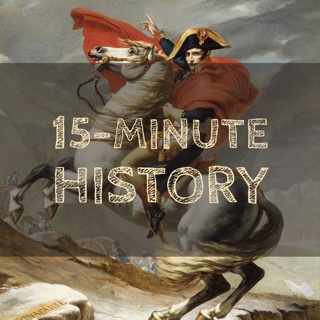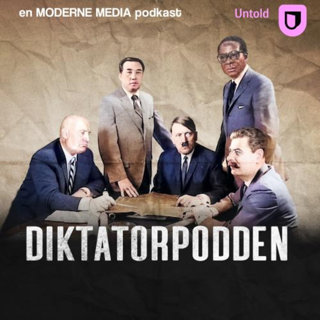
Pop Quiz | Phantom Time
Was Charlemagne real? Did we land on the moon? Who are the real villains in history? Join us in this week's conversation about myths vs. reality and theory vs. facts when it comes to history.And post your ideas for new episodes, comments, and questions in the comments. You make this show a success and we love to hear from you!
14 Aug 5min

Xerxes I | Hubris (Republish)
During the summer break, the 15-Minute History podcast team are republishing some of their favorite episodes. This episode originally aired on January 16, 2024.___Xerxes I, also known as Xerxes the Great, was a Persian king who ruled over the vast Achaemenid Empire from 486 BCE to 465 BCE. He was the son of King Darius I and Atossa, the daughter of Cyrus the Great. This lineage protected Xerxes during his time as a prince and solidified his claim to the throne. Join us as we teach you about Xerxes I, his conquest, and how hubris ruined him.
11 Aug 18min

Pop Quiz | Operation Mincemeat (or) Liar, Liar, Literal Pants on Fire
As Churchill once said, "Truth must be surrounded by a bodyguard of lies," and this is never more true in wartime (or a presidential campaign). This week we discuss a deception operation during World War Two, its effect on the war, and the anatomy of both humans and the continent of Europe!We love hearing from you, so post your comments, questions, and ideas for new pop quizzes below.
7 Aug 6min

Ivan the Terrible | The Sources of Evil (Republish)
During the summer break, the 15-Minute History podcast team are republishing some of their favorite episodes. This episode originally aired on February 26, 2024.___Two men stood in a large room shouting at one another, raging over family and war or accusing each other of incompetence and cowardice. A third man stood nearby, servant of one and friend to both. In a corner, a young woman cowered with her face bruised and her body shaking. Anger swirled around the pair as words grew ever-more harsh. And then, the older man swung his scepter, the symbol of God's might wielded through him on earth, and it crashed into the temple of the younger man. Blood poured from the wound as the youth crumpled to the ground. And then, as if a veil had been lifted from his eyes, the Tsar of all Russia's knees gave out. He cradled his victim in his arms and howled to the heavens, "May I be damned! I've killed my son!"Ivan IV’s long reign was among the most consequential for the Russian empire. His early reforms seemed to indicate that Russia was on the brink of a new age, only for it to fall into darkness as the tsar descended into paranoia and madness. The world soon gave him a new name as war and repression became ways of life under the man history knows as Ivan the Terrible.Join us as we teach you about Ivan the Terrible, his life, and the terror he caused.
4 Aug 18min

Pop Quiz | Health & Safety
Do we need government regulations to protect employees in the workplace? Can labor unions go too far in efforts to safeguard their members? And did the sinking of RMS Titanic have something to do with shoddy health & safety measures?Post your comments, questions, and thoughts about new pop quizzes below!
30 Jul 6min

Colt, Gatling, and Browning | Shooting for the Future (Republish)
Samuel Colt’s name is forever linked to the company he founded and the revolver he called the “Peacemaker.” Born in Connecticut in 1814, he was steeped in America’s gun culture from an early age. His grandfather had served in George Washington’s army, and Samuel inherited an old flintlock pistol from the family hero when he was only six. At the age of fifteen, while working in his father’s textile plant, he built a galvanic cell (basically an early battery) and used it to set off explosives beneath the surface of a nearby pond during the Fourth of July. He continued to experiment with chemicals and combustion—as many young men do—and became fascinated by inventors’ work to create a firearm that could shoot more than bullets before needing to reload.Join us as we teach you about Samuel Colt, Richard Gatling, and John Browning. In this episode, you'll learn about their work, their impact on history, and how their names are culturally relevant - beyond the brand - in our world today.
28 Jul 15min

Pop Quiz | The War of Jenkin's Ear (or) That Escalated Quickly!
What started as a simple question about The War of Jenkin's Ear devolved into a mighty whirlwind on social media, immortality, and Jon's opinion of Elon Musk!Let us know your thoughts or ask questions in the comments below, and tell us if you have ideas about new pop quizzes as well.
24 Jul 5min

The Ash Heap of History | The End of the Cold War (Republish)
During the summer break, the 15-Minute History podcast team are republishing some of their favorite episodes. This episode originally aired on March 20, 2020.___The world's most powerful communist leader ultimately signed his own resignation with a capitalist's pen on Christmas Day 1991. This episode traces the stunning reversal of the Cold War from 1979, when the Soviet Union seemed poised for global victory with only nineteen non-communist nations left outside NATO, to the peaceful collapse of the entire communist empire just twelve years later. Through the strategic partnership of Pope John Paul II, Margaret Thatcher, and Ronald Reagan, the West forced Moscow into an economic competition it couldn't win, while Gorbachev's own reforms backfired as Soviet citizens tasted Western freedoms. Discover how three leaders changed history and why the Cold War's end wasn't the happy ending many expected.
21 Jul 20min




















